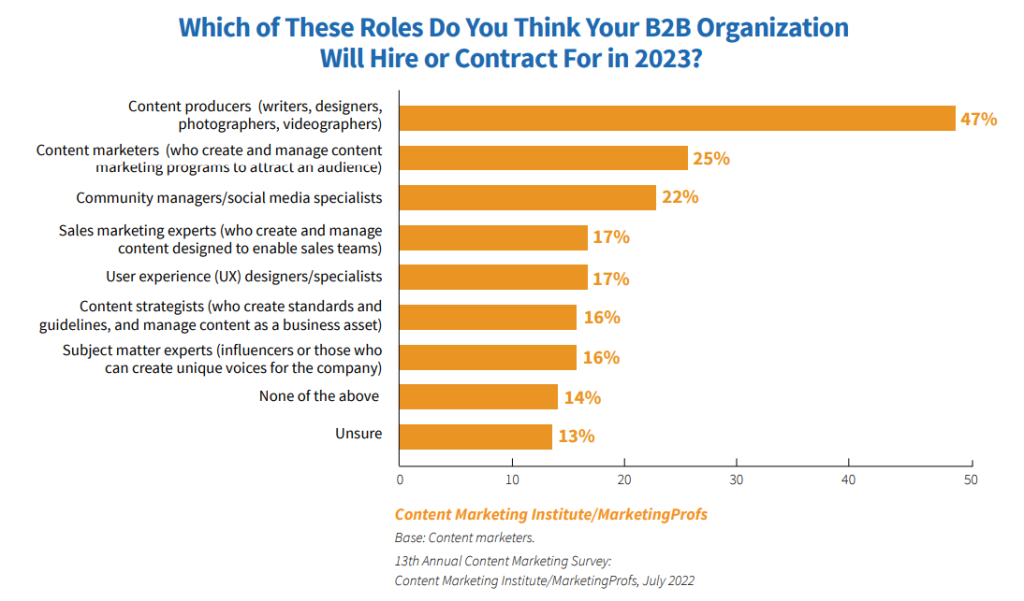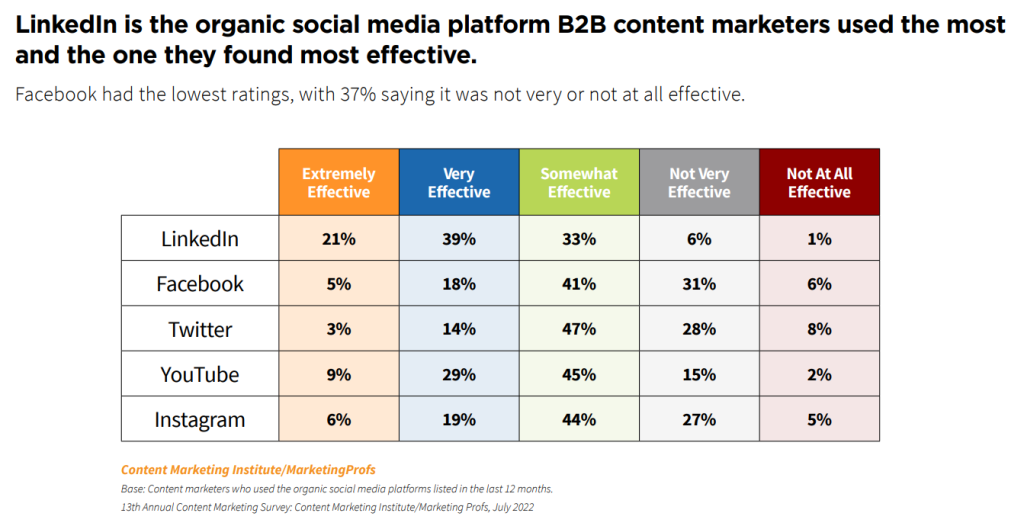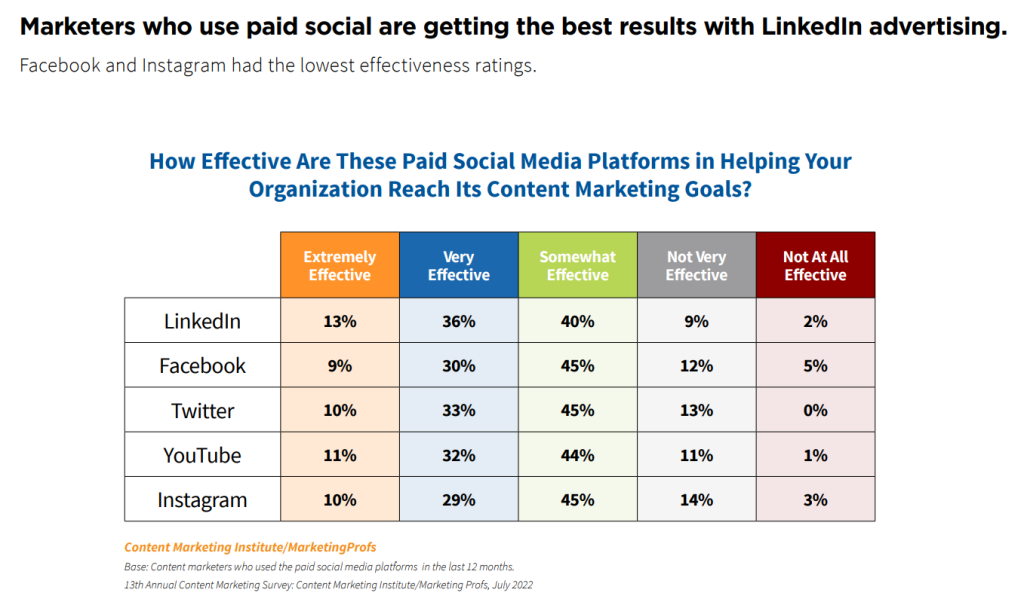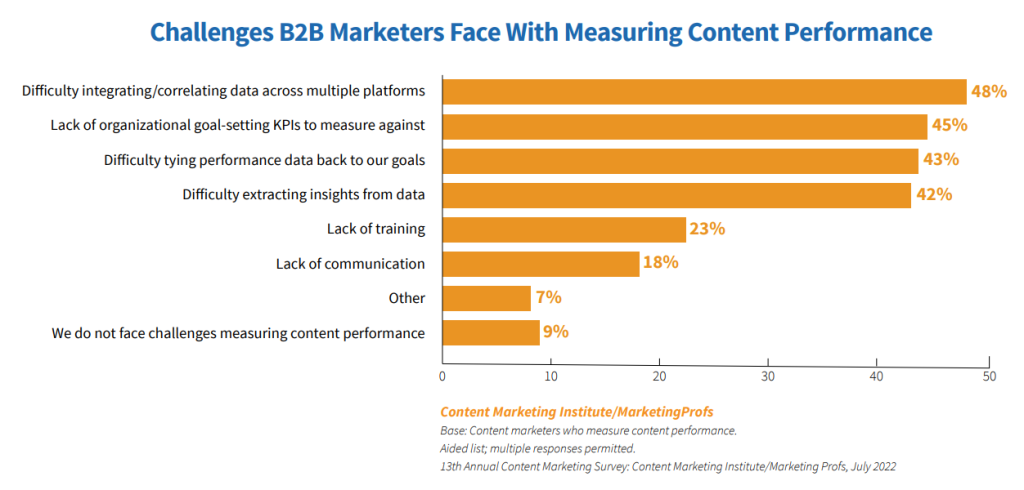LinkedIn Ads Blog – What B2B Content Marketers Need to Know About the Latest Trends Report
Authored byTequia Burt, Editor in Chief, LinkedIn Ads Blog
Editor in Chief, LinkedIn Ads Blog
November 1, 2022
Nearly three-quarters of B2B content marketers (71%) say content is more important this year than last, while only 4% believe it’s less important.
Our industry collectively recognizes this as a critical moment for the B2B content marketing craft. Converging forces like digital transformation, content proliferation, a B2B creative renaissance, and a looming recession have put this function under the spotlight (and microscope).
As such, it’s valuable to gain an up-to-date understanding of how B2B content marketers at large are moving forward to meet these challenges and opportunities. Thankfully, the folks at Content Marketing Institute, MarketingProfs, and ON24 have us covered: their annual B2B content marketing benchmarks, budgets, and trends report just dropped in the nick of time for ‘23 planning.
As always, the entire report is well worth reading, full of useful insights, quotes, and advice. But these are the eight tidbits that struck us as most noteworthy.
At a glance:
- The industry is hungry for specialized content producers: 47% of organizations plan to hire or contract for content producers in 2023.
- The top 3 ingredients of successful B2B content: Practitioners cite producing quality content, covering topics/stories that their competitors aren’t covering, and actively promoting the content they publish as differentiators.
- Online communities are on the rise: 57% of B2B content marketers expect to see investment in social media/community building in 2023, compared with only 37% the previous year.
- Video is taking center stage: Use of video was at 75% this year, up from 66% last year, making it the second-most common content asset type behind short articles.
- In-person events regain ground: Usage was up to 49% from only 19% a year ago. They were also named as the most effective content asset.
- LinkedIn leads the way for organic and paid social: Cited by 93% and 89% of respondents, respectively, as being effective.
- B2B content marketers are struggling to nail down their tech stacks: Only 28% said they have the right technology in place and properly utilized.
- Complexity of modern marketing measurement is a primary challenge: Integrating or correlating data across multiple platforms is cited as the greatest concern among many growing struggles.
The industry is hungry for specialized content producers
When asked which B2B content marketing role their organizations planned to hire or contract for in 2023, the overwhelmingly most common answer was content producers, exemplified by writers, designers, photographers, and videographers.

Roughly half of all respondents (46%) said one group or person is responsible for handling all types of content in their organization. The growing need for specialization in the face of media fragmentation and changing consumption preferences is evident.
Top 3 ingredients in successful B2B content
When it comes to differentiating in the crowded digital content marketplace, practitioners point to three focuses above all:
- Producing quality content (83%)
- Covering topics/stories that their competitors aren’t covering (72%)
- Actively promoting the content they publish (50%)
The top answer should come as no surprise: audiences want quality content. The second and third items are worth reflecting upon, as B2B content marketers have natural tendencies to gravitate toward trendy topics in their industry, and to give content promotion a backseat behind creation.
Online community-building is on the rise
Per the report: “There was a slight uptick in those using their organization’s branded online community to distribute content over the last 12 months (26% this year vs. 22% last year). Yet interestingly, social media/community building is the fifth highest area of B2B content marketing investment for 2023 (with 57% expecting investment in this area, compared with only 37% the previous year).”
The importance of online communities in marketing became elevated as the pandemic struck, with people turning to the web in search of connection, kinship, and support. As brand communities continue to gain traction, those who invest early in establishing them will be at an advantage.
Video continues to take center stage in B2B content marketing
The use of videos increased from 66% in last year’s report to 75% this year, making it the second-most common content asset type behind short articles. Video was also cited as the top area of B2B content marketing investment for 2023, moving up to 78% from 69% last year.
In-person events are back and driving big results
Unsurprisingly, the use of in-person events was quite low in last year’s report (19%), but it saw a huge rebound this year, with 49% of B2B content marketers listing it as a way they reached their audiences. Not only that, but the tactic delivered big returns: in-person events were cited as the content asset delivering best results, narrowly overtaking virtual events and research reports.
As the report concludes, “There’s no denying the power of face to face.”
LinkedIn is the most effective platform for organic & paid social media content
It wasn’t very close on either front. Ninety-three percent of respondents said LinkedIn is effective for organic social media content, including 60% who said it was “extremely” or “very” effective. The next-closest platform was YouTube, at 38 percent.

When it comes to paid social content, LinkedIn was also the favorite, with 89% of practitioners saying the platform is effective for getting results.

B2B content marketers are struggling to nail down their tech stacks
Only 28% of respondents said they have the right technology in place to manage B2B content across their organization. Sixty-one percent said they do not, with an almost even split between those unable to maximize their current tech, and those not having the right tech to begin with.
The researchers hypothesize that too many B2B companies are failing to be strategic in developing their tech stacks, and lacking the proper dedication to management and maintenance of martech tools after implementation.
Complexity of modern marketing measurement is a primary challenge
More than four out of five marketers (81%) say they measure their content performance, which is great! But roadblocks are prevalent in the complicated pursuit of accurately tracking, analyzing, and demonstrating the impact of content in our new environment.
“Developing consistency with measurement” was the third-biggest challenge cited by B2B content marketers. Within that, there are a number of different specific struggles that will sound familiar to many: difficulty integrating or correlating data across multiple platforms; lack of organizational KPI benchmarks; difficulty tying performance data back to goals; difficulty extracting insights from data; etc.

It’s no secret that measurement is one of the most vexing areas of the job for today’s content marketers. It’s also a huge opportunity for competitive advantage. We’ll be focusing much of our blog content for the remainder of this year and into 2023 on helping you bring more clarity and sophistication to your measurement strategy.
For that, plus more ongoing coverage of B2B marketing at large, subscribe and stay in the know.
- Wage Subsidies…. if you are interested. - April 26, 2024
- ‘Junk fees’ or flexible flying? Passenger charges fuel profits — and travellers’ ire - April 26, 2024
- City acknowledges Earth Day with reminder of changes coming to curbside collection May 1 - April 26, 2024
